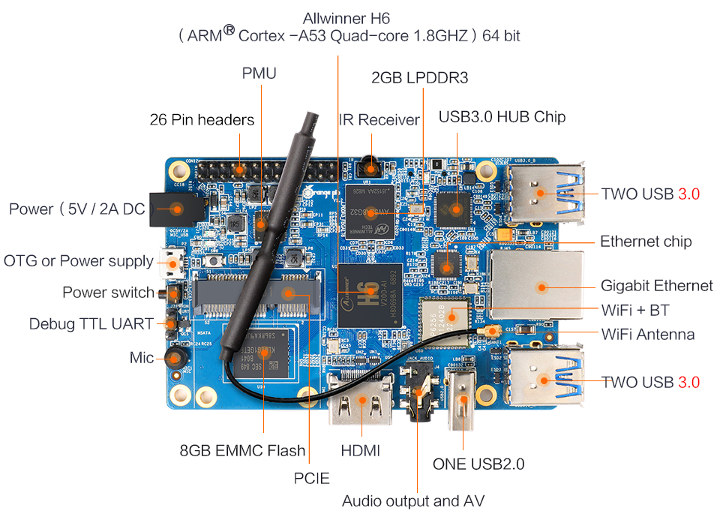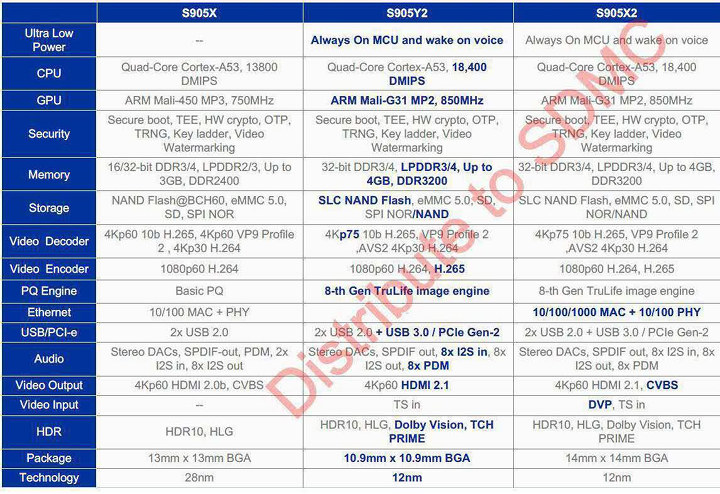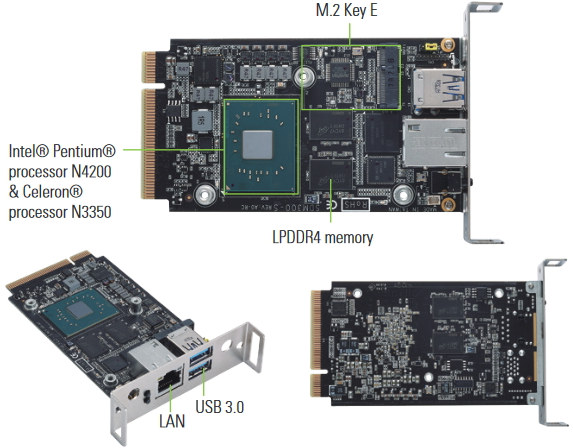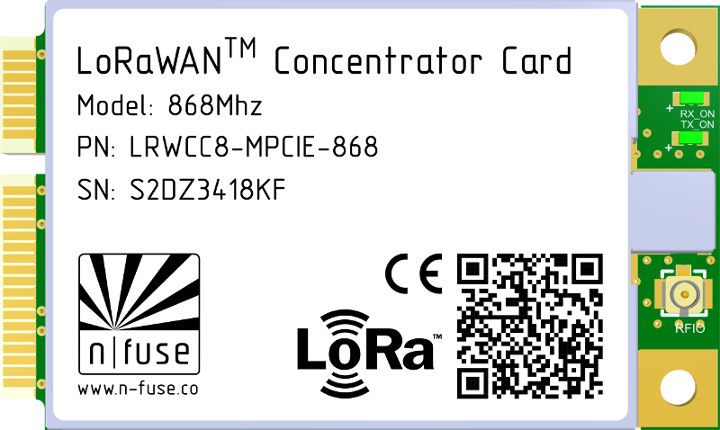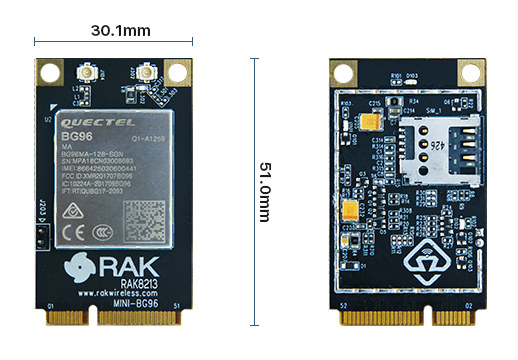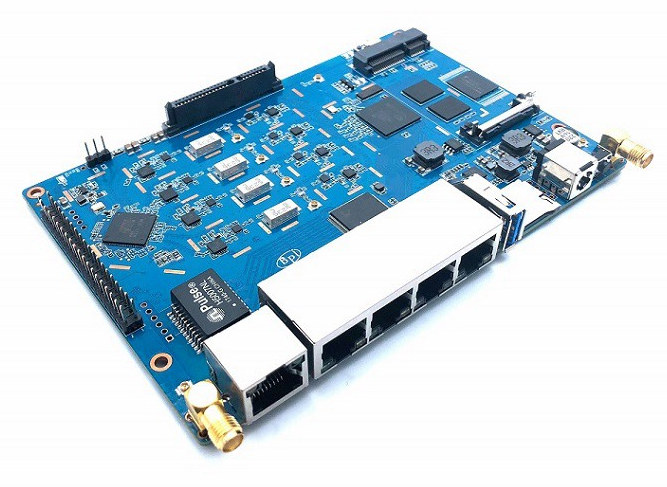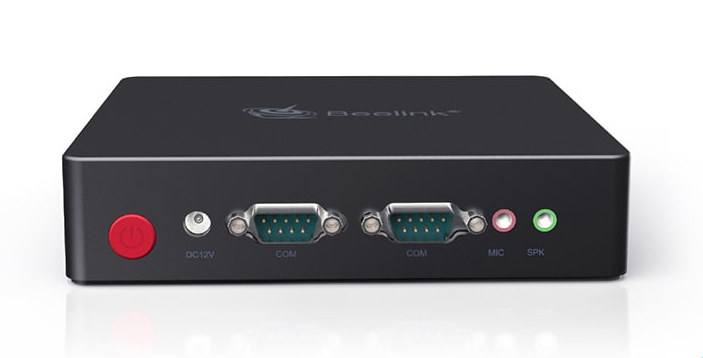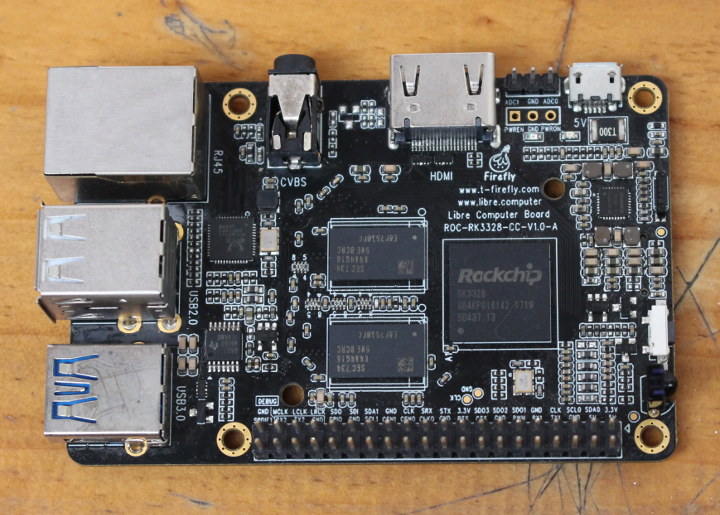When Shenzhen Xunlong Software launched their first Allwinner H6 development board, Orange Pi One Plus, many were disappointed as the board did not make use of some of the key features of H6 processor like USB 3.0 or PCIe, and RAM was limited to 1GB. A couple of weeks later, the company introduced Orange Pi Lite2 board with 802.11ac WiFi, a USB 3.0 port, HDMI 2.0a output, but no Gigabit Ethernet, nor PCIe interface, and again only 1 GB LPDDR3 memory. The good news is we now get a full-featured Allwinner H6 SBC thanks to Orange Pi 3 equipped with up to 2GB RAM, an optional 8GB eMMC flash, Gigabit Ethernet, 802.11ac WiFi 5, four USB 3.0 ports, HDMI 2.0a, a mPCIe slot, and more. There are four variants of the Orange Pi 3 board with either 1 or 2 GB RAM, with or without eMMC flash that share the […]
Comparison of S905X, S905X2, and S905Y2 Processors Specifications
We’ve known the main features of Amlogic S905Y2 and S905X2 processors namely an upgrade to an Arm Mali-G31MP2 GPU with OpenGLES 3.1, and support for USB 3. since last month, and TV boxes launched earlier this month with products such as Beelink GT1 Mini or A95X Plus. But we were still missing some parameters like the manufacturing process, max CPU and GPU frequencies, and so on. We now have all this information and some more thanks to an S905X/S905X2/S905Y2 comparison table released by SDMC a few days ago, and likely coming from Amlogic themselves. There actually more differences than I expected. Going from top to bottom in the comparison table above, the new processors feature an ultra-low power MCU core to be used for wake-word detection, and possibly other features. We did not get CPU frequency numbers per se, but since Amlogic released DMIPS values and Cortex A53 core scores […]
Axiomtek SDM300S is an Intel Apollo Lake Smart Display Module (SDM-S) for Digital Signage
Way back in 2010, Intel introduced the Open Pluggable Specification (OPS) defining mechanical and electrical parameters for players to be integrated into digital signage displays, with the goal of providing an easier upgrade path. Even if it was defined by Intel we’ve seem some Arm based OPS digital players such as the ones offered by ZidooLab. If you’ve checked out the latter link, you’ll know OPS players normally come with a case, and measure 180 x 119 x 30mm to comply with the specifications. But it turns out Intel also introduced a more compact card format for digital signage / displays with Intel SDM (Smart Display Module) available as SDM-S (Small: 60 mm x 100 mm x ~20 mm; up to ~10W TDP) or SDM-L (Large: 175 mm x 100 mm x ~20 mm; up to ~45W TDP) Axiomtek made one of those module with their SDM300S SDM-S module equipped with […]
n-fuse LoRaWAN Concentrator mini PCIe Card Comes with either SX1301 or SX1308 Chip
Most gateways are based on Semtech SX1301 chip, but the company unveiled a SX1308 chip for picocell gateways back in 2016 that’s supposed to be cheaper and used indoors. Designs have been slow to come to market, but a few have been launched recently including n-fuse LRWCCx-MPCIE LoRaWAN concentrator mini PCIe card that comes with either SX1301 or SX1308 chip, and is compatible with Semtech’s Pico Gateway design. n-fuse LRWCCx-MPCIE key features & specifications: LoRa Connectivity SX1301/ SX1308 digital base band processor with dual SX1257 Tx/Rx front-ends Output power level up to 23 dBm u.FL connector (50 Ω impedance) for external antenna 868 MHz model Frequency Range – 863 to 870 MHz Sensitivity – Up to -124 dBm at SF7 (BW 125 KHz), up to -138 dBm at SF12 (BW 125 KHz) 915 MHz model Frequency Range – 915 to 928 MHz Sensitivity – Up to -125 dBm at SF7 […]
RAK8213 mini PCIe Card Comes with GNSS, NB-IoT & eMTC Connectivity
After launching their first wireless communication mini PCIe card with RAK833 LoRaWAN gateway card last month, RAK Wireless is back with another mPCIe card that supports GNSS (GPS, GLONASS), as well as cellular IoT connectivity thanks to Quectel BG96 NB-IoT + LTE Cat M1 module. RAK8213 mini PCIe card specifications: Wireless Connectivity Module – Quectel BG96 with LTE Cat. M1 (eMTC), LTE Cat. NB1 (NB-IoT), EGPRS, and GNSS Global bands support FDD-LTE – B1/ B2/ B3/ B4/ B5/ B8/ B12/ B13/ B18/ B19/ B20/ B26/ B28 TDD-LTE – B39 (for Cat M1 only) EGPRS – 850/900/1800/1900Mhz Max Data Rate – Cat M1: 375 kbps (UL/DL); Cat NB1: 32 kbps DK, 70 kbps (UL) micro SIM slot u.FL connectors for cellular and GNSS mPCIe connector with USB 2.0, I2C, UART, and PCM Misc – LEDs for network and power status Dimensions – 51 x 30.1 mm The card can be added […]
Banana Pi BPI-R64 Router Board is Powered by Mediatek MT7622, Supports 802.11ac WiFi, Optional PoE Module
SinoVoIP launched several Banana Pi router boards in the past starting with Allwinner A20 based Banana Pi BPI-R1 in 2014, and followed by Banana Pi BPI-R2 board powered by a Mediatek MT7623 processor last year. Such boards normally include multiple Gigabit Ethernet ports, as well as at least one SATA connector, and in some cases an mPCIe connector for WiFi or LTE cards. THe company also launched Banana Pi BPI-W2 board a few months ago, but that model is more geared towards multimedia router use cases. The company has now unveiled Banana Pi BPI-R64 router board based on Mediatek MT7622 dual core Arm Cortex-A53 processor, five Gigabit Ethernet port, on-board 802.11ac WiFi, one “laptop” SATA port, as well as an optional PoE (Power-over-Ethernet) add-on board.Banana PI RPI-R64 board specifications provided by the company – which has not always shown to be accurate -: SoC – MediaTek MT7622 dual-core Arm Cortex-A53 […]
Beelink KT03 Client Computer is a $150 Barebone Mini PC with Two COM Ports
Beelink launched several Apollo Lake mini PCs in the last few years, and despite moving to Intel Gemini Lake family for some of their more recent models such as Beelink S2 or Beelink X45, the company has just launched a new Apollo Lake model. The new Beelink KT03 “client computer” is powered by an Intel Celeron J3455 processor, but differs from other mini PCs from the company, as it is sold barebone without RAM nor storage (nor OS), comes with two DB9 RS-232 connectors, and dual Gigabit Ethernet ports. Beelink KT03 specifications: SoC – Intel Celeron J3455 quad core Apollo Lake processor @ 1.5 GHz / 2.3 GHz (Turbo) with 12 EU Intel HD graphics 500 @ 250/750 MHz; 6W TDP System Memory – 1x SODIMM DDR3L socket, no EEC, 1333/1600/1867 MHz; supports up to 8GB RAM Storage – 64Mbit SPI flash for UEFI/BIOS; support for internal 2.5″ SATA drives, […]
Firefly Team Mailbag – Rockchip Development Boards and Accessories
T-Chip Intelligent Technology Co. is a hardware and software technology services company, and a few years ago they setup the “Firefly Team” to provide development boards running Android and/or Linux distributions to the maker community. If I remember correctly the company started with Firefly-RK3288 development board powered, as its name implies, by Rockchip RK3288 processor. Since then they’ve launched several other Rockchip development boards and modules, which I’ve covered on this blog. The company decided to send me some of their recent boards and accessories, so let’s have a look at what I received in my “mailbag”. I’ve also taken a few photos for those who did not watch the video or prefer close up photos. ROC-RK3328-CC “Renegade” Development Board The first board is ROC-RK3328-CC “Renegade” board which was first launched via a crowdfunding campaign by Libre Computer. Both companies have been collaborating on some boards, and Libre Computer makes […]


